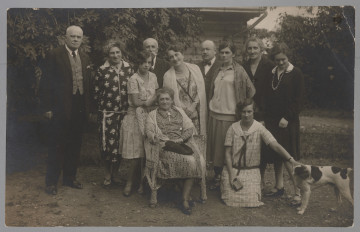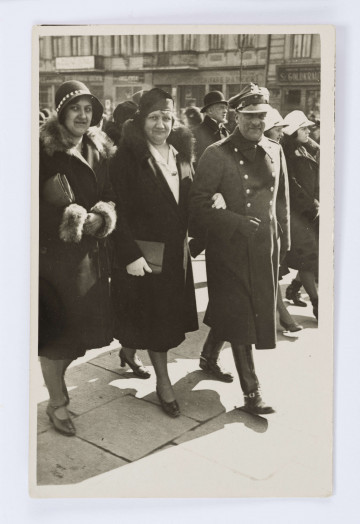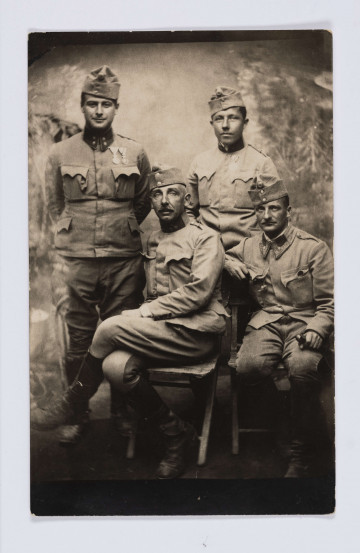
Photograph of a group of people, including Ewa Koralowa and Diana Barlinska (?)
1927
Museum of the history of Polish Jews
Part of the collection: Wincenty Pol
According to the handwritten caption on the back, this joke photograph was taken in Krakow in 1918, when the war on the frontlines of which the men pictured fought had come to an end. Judging from their clothes and poses, they are in the process of demobilisation and are in good humour.
Sitting on the left, in a wicker armchair, is Wacław Żyborski (1893) He spent his youth in military service, initially in the Austrian army, and from 1918 in the Polish Legions. He took part in the Silesian Uprisings and fought in the Polish-Soviet War. He served in the Polish Army until 1929 and later worked in the Voivodship Offices in Tarnopol and Warsaw and in the Ministry of the Interior. During WWII he found himself in the Middle East where he was a co-organiser and board member of the Union of Work for the State. After the war, he spent the rest of his life in England.
Jerzy Pol (1888-1935), one of the grandsons of Wincenty the poet, is seated in the middle, with a dog on his lap. He was born in Lviv, graduated from the School of Commerce in Drohobych, and until 1914 worked as a bookseller in Kołomyja, Lviv, Tule and Tarnopol. At the beginning of World War I he was conscripted into the Austrian army. In 1918 he joined the Polish Army with which he remained for the rest of his life, having attained the rank of major. After the end of hostilities, he settled down with his family in Kraków. In 1930, he was transferred to Lublin where he died suddenly at the age of forty-seven.
The third man on the right is Wacław's brother, Mieczysław Żyborski (1892-1974). Before the First World War he had graduated in pharmacy from Lviv University. Like the other two, he served in the Austrian army, and in 1918 he joined the Polish Army. After his service, from 1922 on, he and his wife ran a pharmacy in Długa Street in Kraków. After participating in the September campaign, he transited through Romania and Yugoslavia to the Middle East, where he joined the Polish Armed Forces. While in the medical service he participated in the battles for Tobruk and Monte Cassino, among others. In 1948, he returned to Kraków to his family and his pharmacy, which was nationalised a few years later.
All the people in the photograph are buried in the Rakowicki Cemetery in Kraków.
Author / creator
Dimensions
cały obiekt: height: 13,8 cm, width: 8,7 cm
Object type
photography
Technique
photographic print
Material
photographic print paper
Creation time / dating
Creation / finding place
Owner
The National Museum in Lublin
Identification number
Location / status

1927
Museum of the history of Polish Jews

1930
National Museum in Lublin

1901 — 1930
National Museum in Lublin
DISCOVER this TOPIC
National Museum in Szczecin
DISCOVER this PATH
Educational path